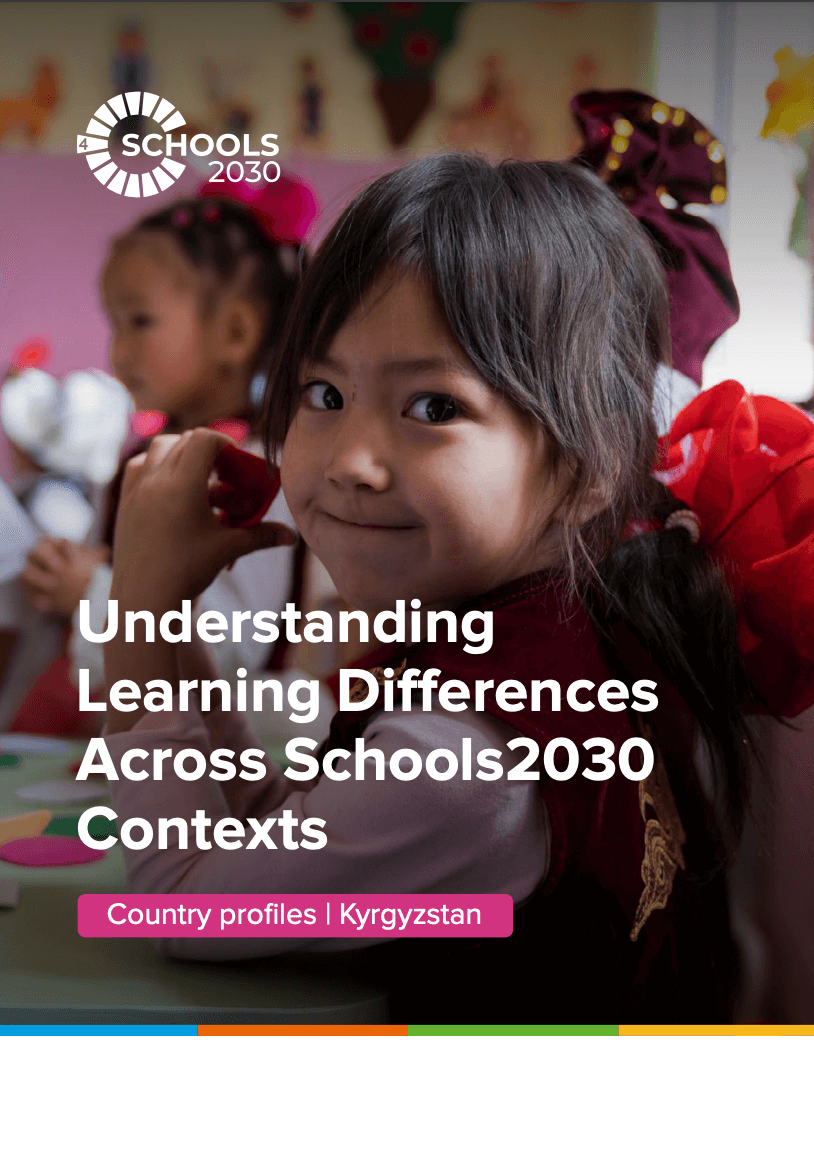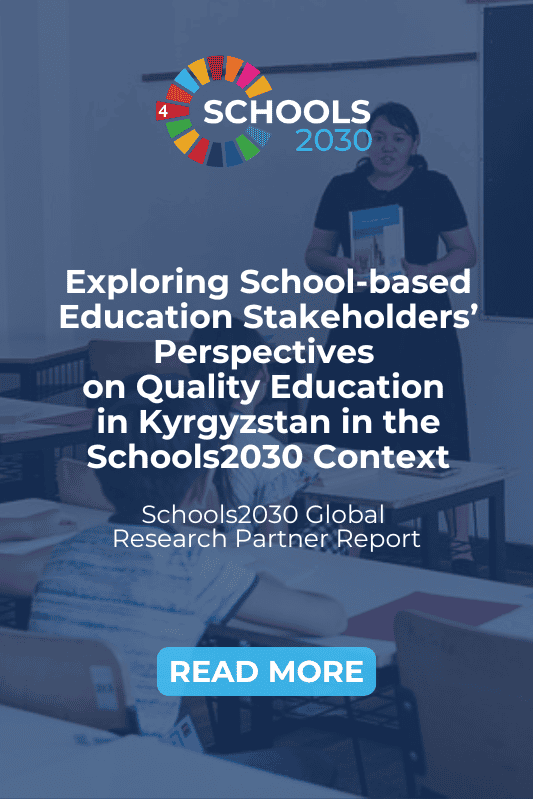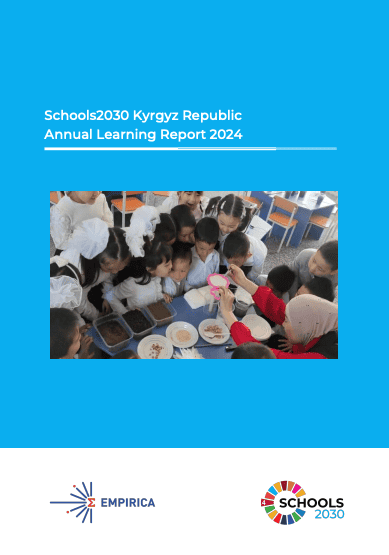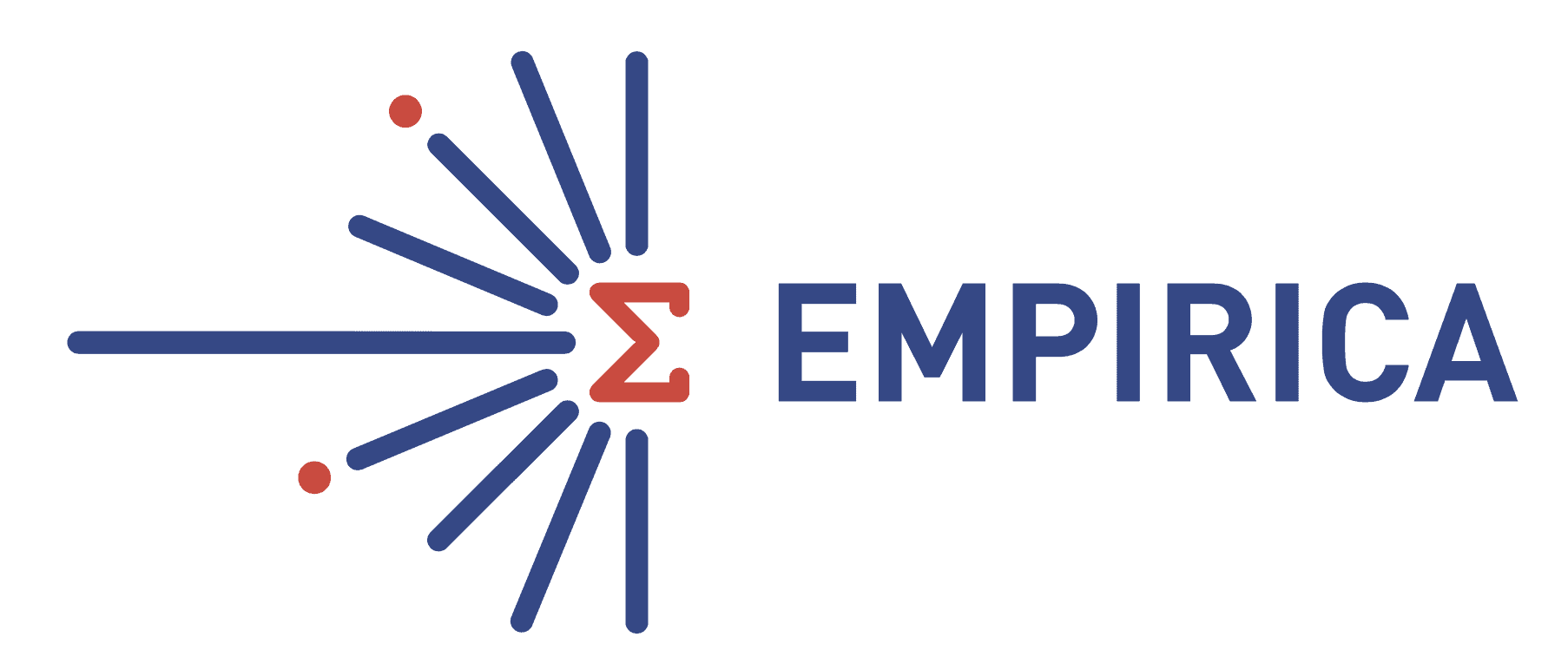Schools2030 Kyrgyzstan
Delivering holistic education in Chui, Batken, Naryn and Osh provinces, and in Bishkek city.
The Schools2030 programme works with 70 schools and 30 kindergartens in the Kyrgyz Republic. These institutions underwent a selection process conducted by AKF and the Ministry of Education and Science of the Kyrgyz Republic, focusing on schools in remote areas and the suburbs of the two main cities.
Each participating school forms a design team consisting of four members based on their roles in the target cohorts and main learning domains. The programme also actively involves school leadership on various HCD steps to ensure their support and engagement. Three out of four members of the design team rotate each year, allowing us to train more teachers in the HCD approach.
The design teams choose their innovation focus based on the results of the Assess and Explore phases with Schools2030 supporting and providing guidance throughout the whole cycle. The teams assess current educational practices, design and prototype innovative solutions, test and implement these prototypes, and then reflect on the outcomes to iterate and improve their innovations. If an innovation does not achieve the desired outcomes at the end of the cycle, the teams analyse the reasons and adapt their approaches for better results.
Our Team in KYRGYZSTAN

Nazira Zholdoshbekova
Schools2030 National Coordinator and AKF Kyrgyzstan Education Programme Manager

Farida Torobekova
Regional Education Coordinator (Osh and Batken oblasts)

Nazgul Kurmanbekova
Regional Education Coordinator (Naryn oblast)
Jypara Tashmamatova
ECD Programme Manager
The KYRGYZ Education Landscape
The Kyrgyz Republic is a mountainous country in Central Asia, famous for its high peaks and steppe grasslands. It has a population of 7 million, of which 34.4% are under 15 years of age.
Show More
The Education Development Strategy of the Kyrgyz Republic for 2021-2040, approved in 2021, sets out a series of goals including access to high quality education for everyone, regardless of socio-economic status, ethnicity, religion, or gender. The strategy also emphasises the introduction of a holistic approach to learning aimed at developing the physical, intellectual, cognitive, social, and emotional abilities of every learner. One of the greatest challenges facing the education sector in the country is the quality of education when nearly half of the students demonstrate knowledge and skills below the established national standards.
The KYRGYZ Education Landscape
The Kyrgyz Republic is a mountainous country in Central Asia, famous for its high peaks and steppe grasslands. It has a population of 7 million, of which 34.4% are under 15 years of age.
The Education Development Strategy of the Kyrgyz Republic for 2021-2040, approved in 2021, sets out a series of goals including access to high quality education for everyone, regardless of socio-economic status, ethnicity, religion, or gender. The strategy also emphasises the introduction of a holistic approach to learning aimed at developing the physical, intellectual, cognitive, social, and emotional abilities of every learner. One of the greatest challenges facing the education sector in the country is the quality of education when nearly half of the students demonstrate knowledge and skills below the established national standards.
THE THREE-STEP MODEL IN KYRGYZSTAN
ASSESS
The National Advisory Committee in Kyrgyzstan – comprised of representatives from the Ministry of Education and Science of the Kyrgyz Republic, the Kyrgyz Academy of Education, the Republican Institute for Advanced Training and Re-Training, and various national and district level education authorities and experts – met early in 2021 with the Schools2030 team to determine what should be focused on for assessment and later innovation work. Learning domains were selected that align with curricular priorities and encompass the academic and non-academic skills on which the programme will focus.
The National Learning Partner and Assessment Partner was brought on board to support the development of rapid assessment tools for the domains, with technical support also provided by Oxford MeasurEd, the Global Assessment Coordinating Partner. These tools are designed to support teachers to qualitatively assess their students on non-academic domains for which there are no pre-existing assessment tools in the country.
So far, over 300 teachers have received assessment trainings in schools across various regions. The evidence drawn from these assessments have been used by teachers in the early stages of their HCD design work. A set of more robust and validated assessment tools have also been developed, including a contextualised version of the Save the Children’s IDELA, which has never before been used in the country.
Priority Learning Domains
KYRGYZSTAN
PRE-SCHOOL
- Literacy
- Numeracy
- Collaboration
- Empathy
- Communication
PRIMARY SCHOOL
- Literacy
- Numeracy
- Science
- Critical Thinking
- Leadership
SECONDARY SCHOOL
- Literacy
- Numeracy
- Taking Responsibility
- Critical Thinking
- Leadership
Access examples of assessment tools
from across our programme countries.
All these tools are available free to download below and will continue to be refined and iterated to ensure robust psychometric validity.
As part of the Schools2030 programme, our teachers are constantly refining their teaching approaches, to adjust their teaching to students’ needs and abilities.
Nazgul Kalykovn, School Director, Kyrgyz Republic
INNOVATE
The Schools2030 Kyrgyz Republic team have worked to refine the initial Human-Centred Design (HCD) model, and alongside the National Learning Partner, the Assessment Partner and a team of facilitators have used feedback to refine and further contextualise the process. The HCD Toolkit has now been translated into Kyrgyz and Russian.
The team conducts HCD workshops at school level across the target regions, with trainings taking place in three rounds. The first of these rounds included ‘Launch, Explore, Define and Generate’ phase, the second round a ‘Make and Test’ phase, and the third a ‘Test and Iterate’ phase. At the end of each year, the target Schools2030 schools present their innovations at regional level and provide feedback to one another. The innovations show how teachers are combining a focus on academic and non-academic skills to improve student engagement and learning. They will continue to test and refine these innovations, as well as create new ones through the HCD process, over the coming years.
Download our HCD Tools for Kyrgyzstan to start creating education innovations in your school.
Schools2030 Human-Centred Design Toolkit
Full version: Kyrgyz
Schools2030 Human-Centred Design Toolkit
Sprint version: Russian
Schools2030 Human-Centred Design Facilitator Guide
Schools2030 Human-Centred Design School Leader Guide
Kyrgyz
SHOWCASE
As in other Schools2030 countries, teachers in the Kyrgyz Republic are encouraged to showcase their ideas and innovations that they design to address key educational challenges. In the Kyrgyz Republic this includes the broad aims of improving student outcomes, fostering climate resilience, and integrating interdisciplinary learning. Showcasing teacher-led innovations not only gives educators the recognition they deserve but also encourages others to adopt similar practices. By providing a platform for teachers to demonstrate their impact, Schools2030 promotes a culture of continuous innovation and professional growth across schools.
Across 70 schools and 30 preschools, 400 teachers develop around 100 classroom-level solutions annually, which are showcased at public forums, regional workshops, and district-level seminars. Teachers present their work to peers, local education authorities, and other stakeholders, using interactive demonstrations to highlight the practical impact of their innovations. For example, projects like the “AQUA Club” in Naryn or eco-friendly firewood initiatives in Osh are regularly featured to show how local innovations can improve academic performance and promote environmental sustainability.
Show More
Schools2030 Kyrgyzstan hosts several showcasing events every year, including knowledge-sharing seminars at the district level and larger-scale events such as the Schools2030 Global Forum. These events engage teachers from Schools2030 pilot schools, local government representatives, civil society organizations, and sometimes business leaders, providing a platform to amplify the impact of the showcased projects. These events foster collaboration and encourage the exchange of innovative ideas to improve education practices across the country.
The selection of which teachers’ work is showcased is based on the innovation, relevance, and impact of their projects. Teachers whose work aligns with national education priorities—such as promoting climate resilience and developing holistic learning outcomes—are prioritized. Additionally, those who demonstrate leadership and inspire their peers are often chosen to present their work, ensuring the showcased projects reflect best practices that can be adopted widely.
Outside of Schools2030-hosted events, teachers have opportunities to participate in national platforms like the all-republican teacher conference, where they can share their innovations with a wider audience. Regional initiatives such as the “Jashyl Muras” campaign also offer additional platforms for showcasing environmentally focused projects. Schools2030 provides support to teachers in preparing for these opportunities, ensuring their innovations are presented effectively and reach a broad range of stakeholders.
News and stories from Kyrgyzstan
IMPACT AND LEARNING
Kyrgyz Republic
We regularly produce learning and research reports that inform and strengthen our programme delivery. Read and share our latest learnings for the Kyrgyz Republic or click below to browse all our reports.

Learning Differences - Kyrgyzstan

Research Report

Learning Report 2024
OUR Kyrgyz partners
Country Assessment Partners, Evaluation Partners and Learning Partners
In-country Assessment Partners initially supported the development of Schools2030 assessment tools and offer ongoing guidance for teachers in using them. Learning partners in each country track and measure the efficacy of the innovations and teacher professional development, and produce yearly reports with recommendations for how to make the programme stronger. Find out more about how our global and national partnerships work on our Coalition page.



Explore Schools2030 in our other countries.








